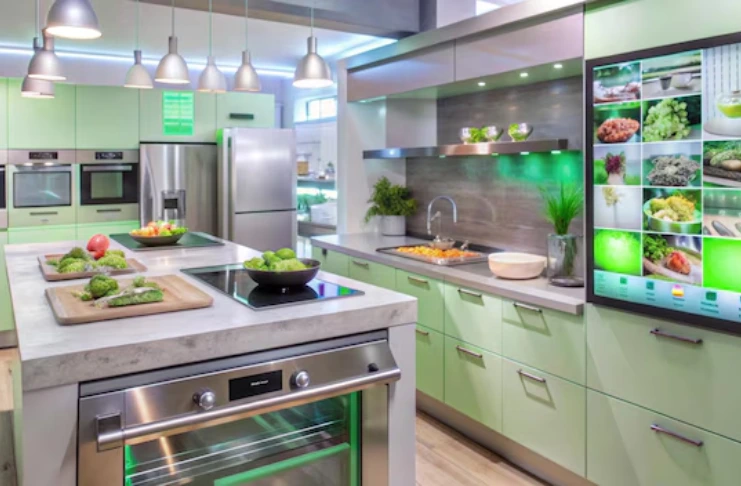Today, many people want to eat healthy. They want to know what is in their food. Also, they want to keep track of what they eat every day. This helps them stay healthy and feel good. One way to do this is by using smart kitchens and nutrition tracking apps together.
What Is a Smart Kitchen?
A smart kitchen uses new technology to help with cooking and food. It has tools and devices that talk to each other. These devices can be smart fridges, ovens, scales, or even lights. They make cooking easier and faster. Some can tell you if food is fresh or help you follow recipes.
What Are Nutrition Tracking Apps?
Nutrition tracking apps help people watch what they eat. They show how many calories, vitamins, and minerals are in food. People use these apps to keep a food diary. The apps can tell if you eat too much sugar or salt. This helps people make better choices about food.
How Do Smart Kitchens and Nutrition Apps Work Together?
When smart kitchens and nutrition apps connect, they share information. This makes it easier to track food and eat healthy. Here is how they work together:
- Food Data Sharing: Smart fridges and scales send data to apps.
- Recipe Help: Apps suggest meals based on what is in the kitchen.
- Portion Control: Smart scales help measure food amounts.
- Shopping Lists: Apps create lists based on recipes and food left.
- Meal Planning: Apps plan meals to meet nutrition goals.
Smart Kitchen Devices That Help Nutrition Tracking
Some smart kitchen tools are very helpful for tracking nutrition:
| Device | Function | How It Helps Nutrition Tracking |
|---|---|---|
| Smart Fridge | Keeps food fresh and tracks items inside | Tells app what food is available to use |
| Smart Scale | Measures food weight accurately | Helps track portion sizes and calories |
| Smart Oven | Controls cooking temperature and time | Suggests recipes and adjusts cooking to stay healthy |
| Smart Pantry | Tracks food stock and expiration dates | Alerts when food is low or expired to reduce waste |

Credit: www.amazon.com
Benefits of Integrating Smart Kitchens with Nutrition Apps
This integration brings many good things. Here are some benefits:
- Easy Tracking: Food data automatically goes to your app.
- Better Food Choices: Apps suggest meals based on your goals.
- Less Waste: You use food before it goes bad.
- Save Time: No need to write down food by hand.
- Stay Healthy: You know exactly what you eat every day.
Examples of How This Works in Real Life
Imagine you have a smart fridge. It sees you have apples, spinach, and chicken. It sends this info to your nutrition app. The app then suggests a healthy chicken salad recipe. You use a smart scale to measure the chicken. The app shows calories and nutrition for the meal. After you eat, the app updates your food log.
Or think about meal planning. Your app knows what food you have. It plans meals for the week. It makes a shopping list for missing ingredients. You buy only what you need. This saves money and helps you eat well.
Challenges to Keep in Mind
While smart kitchens and apps are helpful, some challenges exist:
- Cost: Smart devices can be expensive.
- Technology: Some people find it hard to use new devices.
- Privacy: Sharing food data may worry some users.
- Compatibility: Not all devices work with all apps.
Still, many find these challenges easy to manage. As technology grows, it will get simpler and cheaper.

Credit: www.amazon.com
Tips to Use Smart Kitchens and Nutrition Apps Well
If you want to try this, here are some tips:
- Start with one smart device, like a smart scale or fridge.
- Choose a nutrition app that is easy to use.
- Link your devices and apps carefully by following instructions.
- Use the app daily to track your meals and food.
- Try new recipes suggested by the app to stay motivated.
Future of Smart Kitchens and Nutrition Tracking
In the future, smart kitchens and nutrition apps will get better. They may:
- Use sensors to check food quality and nutrition instantly.
- Give more personalized meal advice based on your health.
- Make cooking fully automatic for healthy meals.
- Help doctors and dietitians see your food data easily.
These ideas show how technology can help people eat better every day.
Frequently Asked Questions
How Do Smart Kitchens Connect With Nutrition Tracking Apps?
Smart kitchens use Wi-Fi or Bluetooth to share cooking data with nutrition apps automatically.
Can Smart Kitchens Help Track Calories During Cooking?
Yes, they estimate calories based on ingredients and cooking methods used.
Which Kitchen Devices Sync With Nutrition Tracking Apps?
Devices like smart ovens, scales, and refrigerators often sync with nutrition apps.
Do Nutrition Apps Update Recipes Based On Smart Kitchen Data?
Some apps adjust recipes by analyzing what you cook and your dietary goals.
Conclusion
Smart kitchens and nutrition tracking apps work well together. They help people eat healthy by giving clear food information. These tools save time and reduce food waste. They make meal planning easy and fun. Even if you are new to technology, you can start small. Using smart devices and apps can improve your health step by step. The future will bring even more helpful tools in the kitchen.

